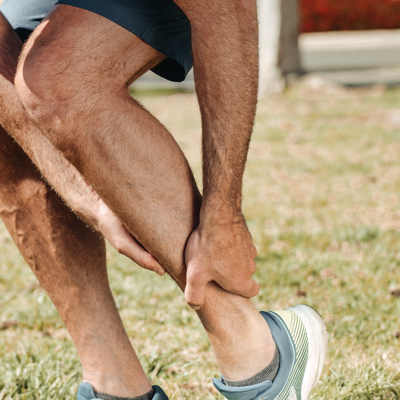It’s Mental Health Awareness Week and the focus this year is on anxiety – something that running, in fact all exercise, can help to alleviate. In this blog I explore what happens inside our brains when we exercise which can help us to understand the positive impact running can have on our mental health.
Over eight million people in the UK are living with an anxiety disorder at any one time – that’s roughly 1 in 10. Anxiety is a big problem in our society today.
While causes of anxiety are broad and complex; things like financial worries, social isolation, stress at work, bereavement, racism or abuse can all trigger anxiety – and of course as I write this in May 2023 it won’t surprise you to hear that people in the UK are experiencing heightened levels of anxiety and stress in response to the cost-of-living crisis.
While it is normal to feel anxious from time to time, anxiety disorders are characterised by feeling anxious all, or most of, the time and can have a debilitating affecting on a person’s ability to function on a day to day basis.
Anxiety can take many forms, but Generalised Anxiety Disorder (GAD) is the most common type and presents itself as excessive worrying about different activities and events. Other types of Anxiety include: Panic Disorder (PD), Post Traumatic Stress Disorder (PTSD), Obsessive Compulsive Disorder (OCD), Social Anxiety Disorder. Each different form can present with different characteristics. Anxiety is complex, widespread and leads to very real problems for sufferers.
It’s well-documented and accepted that exercise, including running, can benefit our mental health, and even compares favourably to antidepressant medications as a first-line treatment for mild to moderate depression.
For example, a 2018 systematic study, published in BMC Health Services Research, compared the use of exercise interventions to a waiting list control group in the treatment for anxiety. In this study, exercise included running, walking, treadmill training or supervised aerobic training sessions, carried out regularly for at least two weeks. It found that aerobic exercise was effective in the treatment of anxiety compared to the waiting list control groups and that high-intensity exercise (performed to a minimum of 60% HR max) showed greater effects than low-intensity programmes. Running of course lends itself very well to being able to be performed at many different levels of intensity.
A 2023 study, published in the British Journal of Sports Medicine, examined more than 97 review papers and over 1,000 research trials looking at the effects of physical activity on depression, anxiety and psychological distress. It revealed that exercise, at a volume of 150 minutes each week, is highly beneficial for improving symptoms of anxiety. It concluded that ‘physical activity should be a mainstay approach in the management of depression, anxiety and psychological distress’.
Despite the clear evidence of its benefits, exercise is yet to be widely adopted therapeutically, perhaps because it is so difficult to compare the different studies, and also because of the perceived difficulty of prescribing and monitoring physical activity in a clinical setting.
Anecdotally, runners certainly widely attest to the benefits of running in improving anxiety symptoms. You might have experienced the benefit yourself, or spoken to others in your local running community. It is frequently sighted that running materially and tangibly helps anxiety symptoms.
How does running help reduce anxiety – biologically and psychologically?
There are multiple mechanisms that co-exist and help us to understand the effects of running in reducing anxiety. These have been demonstrated in research conducted in animal studies, but also in a growing number of clinical studies in humans. Previously the effects of running were simplified down to one molecule or pathway, but we are now understanding that it is a more complex and far reaching effect. The benefits consist of a range of complex neurobiological factors such as brain-derived neurotrophic factor (BDNF), serotonin, dopamine, reducing inflammatory cytokines and cortisol and changing structural pathways in the brain, eg the hippocampus and prefrontal cortex. Yes, this is well documented in clinical journals, and therefore easy for me to reproduce with certainty that it came from an authoritative source!
So, what does all of this actually mean and how does it help us? Let’s look at some of these neurobiological factors individually, starting first with brain-derived neurotrophic factor (BDNF), which has been shown to increase when we exercise. It helps to stimulate activity in the brain in the short and long term , notably increasing the connections (synapses) between key areas of the brain and helps stimulate the growth of new nerve cells.
This is significant because BDNF is reduced in people with anxiety. And the release of this helps to stimulate the activation of brain areas that are reduced in size or functioning less well.
So what about the more commonly known neurotransmitters such as serotonin and dopamine, which are also raised when we run? Serotonin is thought to influence mood and dopamine is a reward neurotransmitter and provides a feeling of achievement. The effects of each of these is more powerful when combined with one another.
While endorphins, often described as the ‘happy hormone’, have long thought to explain the feel-good factor many of us experience after a run, some believe that the importance of endorphins has been greatly overstated. It is too simplistic. While endorphins are released during exercise, these have difficulty crossing the blood-brain barrier alone unless they are combined with other molecules. So there is far more to the effect of running on our mood and mental health than just an endorphin rush.
However, one molecule which can cross the blood-brain barrier is the endocannabinoid. These are neurotransmitters that bind to the cannabinoid receptors in the brain, causing similar effects to those of the active component cannabis . The relaxed feeling after exercise can be partially accounted for by the release of these endocannabinoids which exert a feeling of calmness and that’s particularly important for people with anxiety.
How else can running help reduce anxiety?
Exercise has a powerful multisystem effect on the mind and body – and so although these physiological and biological mechanisms can help explain its effects, so can the various psychological and social factors which are also at play.
Running can increase self-esteem and bring a sense of achievement, which can all contribute to alleviating symptoms of anxiety. ‘Sufferers of anxiety disorders and depression can often withdraw from social situations, so running with others can be a good way of socialising with others encouraging that social interaction which can improve overall wellbeing.
Running is certainly often described anecdotally as a mediative experience. Many runners report that running, and running with friends, helps alleviate some symptoms. The head space, gossip and physical exertion help to control the anxiety.
At another level it is just a phenomenal distracter, taking your mind off the triggers of anxiety. It can take your mind off things so you can get away from the cycle of thoughts that you might be stuck in. Many people listen to music when they run too, and I think the combination of those things is a good way to disrupt that cycle of overthinking.
The benefits of exercise in reducing anxiety are tangible and indisputable. But turning to running as standalone solution for alleviating symptoms of anxiety is not to be recommended. Although exercise can reduce anxiety symptoms, it might not be enough as a standalone treatment. As with any clinical condition, exercise (in this case running) can help but if your anxiety is impacting on your day-to-day life or ability to function, you should seek help from a mental health professional of your GP.
If you are struggling with anxiety, visit your GP who can talk to you about your mental health and help introduce you to the right mental health service. You can also self-refer for NHS talking therapies, counselling, other therapies, and guided self-help, by visiting nhs.uk/service-search/mental-health/find-an-NHS-talking-therapies-service/.




